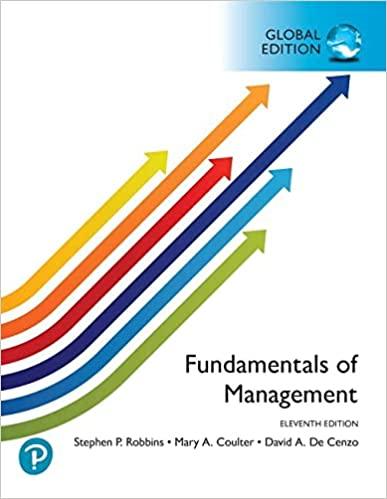Admit it. Sometimes the projects youre working on (school, work, or both) can get pretty boring and
Question:
Admit it. Sometimes the projects you’re working on (school, work, or both) can get pretty boring and monotonous.
Wouldn’t it be great to have a magic button you could push to get someone else to do that boring, timeconsuming stuff? At Pfizer, that “magic button” is a reality for a large number of employees.
As a global pharmaceutical company, Pfizer is continually looking for ways to help employees be more efficient and effective.
The company’s senior director of organizational effectiveness found that the “Harvard MBA staff we hired to develop strategies and innovate were instead Googling and making PowerPoints.” Indeed, internal studies conducted to find out just how much time its valuable talent was spending on menial tasks was startling. The average Pfizer employee was spending 20 percent to 40 percent of his or her time on support work (creating documents, typing notes, doing research, manipulating data, scheduling meetings) and only 60 percent to 80 percent on knowledge work (strategy, innovation, networking, collaborating, critical thinking). And the problem wasn’t just at lower levels. Even the highest-level employees were affected. Take, for instance, Chaz, an executive director for global engineering. He enjoys his job—assessing environmental real estate risks, managing facilities, and controlling a multimillion-dollar budget. But he didn’t so much enjoy having to go through spreadsheets and put together PowerPoints. Now, however, with Pfizer’s “magic button,” those tasks are passed off to individuals outside the organization.
Just what is this “magic button”? Originally called the Office of the Future (OOF), the renamed PfizerWorks allows employees to shift tedious and time-consuming tasks with the click of a single button on their computer desktop.
They describe what they need on an online form, which is then sent to one of two Indian service-outsourcing firms.
When a request is received, a team member in India calls the Pfizer employee to clarify what’s needed and by when.
The team member then e-mails back a cost specification for the requested work. If the Pfizer employee decides to proceed, the costs involved are charged to the employee’s department. About this unique arrangement, Cain said that he relishes working with what he prefers to call his “personal consulting organization.”
The number 66,500 illustrates just how beneficial PfizerWorks has been for the company. That’s the number of work hours estimated to have been saved by employees who’ve used PfizerWorks. Other outcomes include: a reduction in project-related costs, employee productivity increased, turnaround time for projects reduced, and wide acceptance by Pfizer employees. What about Chaz’s experiences? When he gave the virtual assistant company team a complex project researching strategic actions that worked when consolidating company facilities, the team put the report together in a month, something that would have taken him six months to do alone.
He says, “Pfizer pays me not to work tactically, but to work strategically.”
Discussion Questions
1. Describe and evaluate what Pfizer is doing with its PfizerWorks.
2. What structural implications—good and bad—does this approach have? (Think in terms of the six organizational design elements.)
3. Do you think this arrangement would work for other types of organizations? Why or why not? What types of organizations might it also work for?
4 What role do you think organizational structure plays in an organization’s efficiency and effectiveness? Working together with your assigned group, discuss this.
Step by Step Answer:

Fundamentals Of Management
ISBN: 9781292307329
11th Global Edition
Authors: Stephen P. Robbins, Mary A. Coulter, David A. De Cenzo





